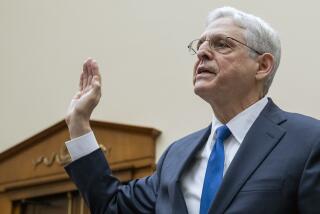IRAN--CONTRA HEARINGS : Byrd Accuses Administration of Fostering ‘Culture of Lying’
WASHINGTON — Senate Majority Leader Robert C. Byrd (D-W. Va.), in a Senate speech Thursday designed to convey the message Democrats hope the public will receive from the Iran- contra hearings, denounced “a culture of lying” within the Administration.
Because of “a deep hostility toward the legislative branch of this government . . . the White House became a haven for a conspiracy of silence and cover-up fundamentally at odds with our constitutional system of openness,” Byrd said. It “led to the wholesale diminishment and corruption of the public estate.”
The toughly worded speech, one of the sharpest criticisms of the Administration that the Democratic leader has made, reflects the growing frustration that Byrd and other Democratic officials have felt about the impact of the Iran-contra hearings, particularly Lt. Col. Oliver L. North’s use of the hearings as a platform to talk about Administration policies.
Admitted Misleading Congress
North, the former National Security Council aide, former National Security Adviser John M. Poindexter and other Administration witnesses have admitted misleading and circumventing Congress to maintain secrecy during the Iran arms sales and the campaign to support Nicaragua’s rebels but have defended their reasons for doing so.
“In the white heat and glare of television lights, the role of the Congress . . . may seem difficult to comprehend,” Byrd said. “But a lie said on television is still a lie. A flawed policy, however well articulated, is still flawed.”
Byrd also lashed out at efforts by the Senate’s Republican minority, backed by the Administration, to stall key legislation by a combination of veto threats and parliamentary maneuvering. The “broad-gauged strategy of (using) veto after veto” to kill legislation could backfire, he warned, threatening approval of Reagan’s own initiatives, including possible arms treaties with the Soviets.
‘Cannot Be Trusted’
The majority leader said that the Administration’s actions, particularly in the Iran initiative, have “led to a deep suspicion among members of Congress that this Administration cannot be trusted.”
Senate Minority Leader Bob Dole (R-Kan.), responding to Byrd’s address, conceded that “presidents would spare themselves a lot of grief if they confided” in congressional leaders before embarking on covert projects like the arms sales. But Dole denied that the Administration had been uncooperative with congressional Democrats on pending legislation.
Since late spring, Democrats have complained that the Administration was refusing to help work out compromises on issues ranging from the federal budget, arms control and campaign reform. Byrd said that at various times Reagan has threatened to veto virtually every major measure currently on the congressional calendar.
Democrats Hit on Budget
Republicans have defended the Reagan strategy, saying that many of the Democratic initiatives are budget busters and represent attempts by the party to use its majority in Congress to create campaign issues for the 1988 election.
But, Byrd said, for “a President who has lost great credibility with the American people to adopt such a strategy of confrontation seems highly counterproductive.”
” . . . Having taken the country through one traumatic experience, the President is now proposing to polarize it in order that he may once again be perceived as the ‘Top Gun,’ ” he said.
More to Read
Get the L.A. Times Politics newsletter
Deeply reported insights into legislation, politics and policy from Sacramento, Washington and beyond. In your inbox three times per week.
You may occasionally receive promotional content from the Los Angeles Times.











